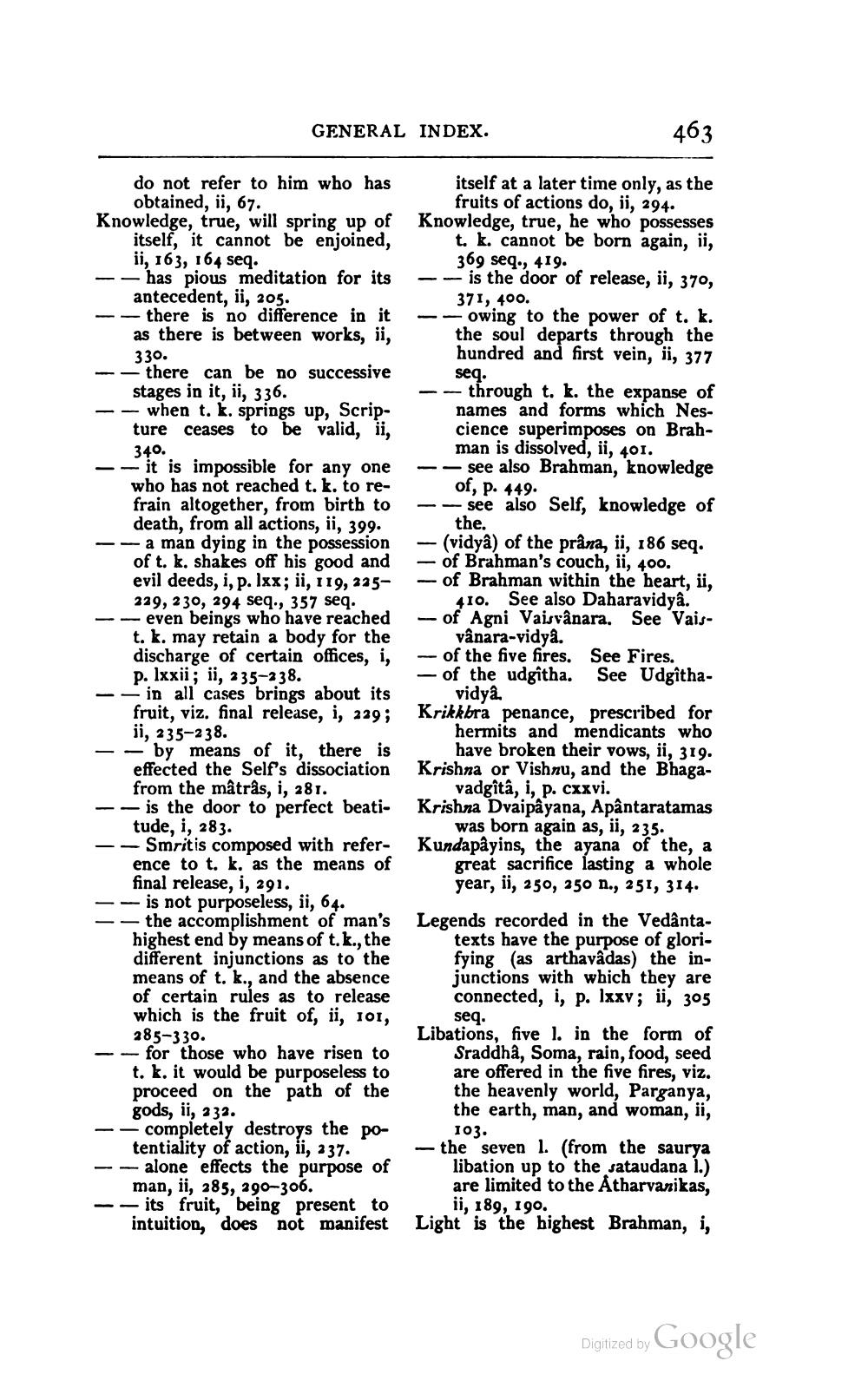________________
GENERAL INDEX.
463
do not refer to him who has
obtained, ii, 67. Knowledge, true, will spring up of
itself, it cannot be enjoined,
ii, 163, 164 seq. -- has pious meditation for its
antecedent, ii, 205. - - there is no difference in it
as there is between works, ii,
330. - there can be no successive
stages in it, ii, 336. - when t. k. springs up, Scripture ceases to be valid, ii, 340. - it is impossible for any one who has not reached t. k. to refrain altogether, from birth to death, from all actions, ii, 399. - a man dying in the possession of t. k. shakes off his good and evil deeds, i, p. Ixx; ii, 119, 125- 229, 230, 294 seq., 357 seq. - even beings who have reached t. k. may retain a body for the discharge of certain offices, i,
p. lxxii; ii, 235-238. - - in all cases brings about its
fruit, viz. final release, i, 229; ii, 235-238. - by means of it, there is effected the Self's dissociation
from the mâtrâs, i, 281. -- is the door to perfect beati-
tude, i, 283. - Smritis composed with refer- ence to t. k. as the means of final release, i, 291. - is not purposeless, ii, 64. - the accomplishment of man's highest end by means of t. k., the different injunctions as to the means of t. k., and the absence of certain rules as to release which is the fruit of, ii, 101, 285-330. - for those who have risen to t. k. it would be purposeless to proceed on the path of the gods, ii, 232. - completely destroys the po
tentiality of action, ii, 237. ---alone effects the purpose of
man, ii, 285, 290-306. - its fruit, being present to intuition, does not manifest
itself at a later time only, as the
fruits of actions do, ii, 294. Knowledge, true, he who possesses
t. k. cannot be born again, ii,
369 seq., 419. -- is the door of release, ii, 370,
371, 400. - owing to the power of t. k. the soul departs through the hundred and first vein, ii, 377 seq. - through t. k. the expanse of names and forms which Nescience superimposes on Brah
man is dissolved, ii, 401. -- see also Brahman, knowledge
of, p. 449. - see also Self, knowledge of
the. — (vidya) of the prâna, ii, 186 seq. - of Brahman's couch, ii, 400. -of Brahman within the heart, ii,
410. See also Daharavidya. -- of Agni Vaisvânara. See Vais
vânara-vidya. - of the five fires. See Fires. - of the udgitha. See Udgitha
vidya Krikkbra penance, prescribed for
hermits and mendicants who
have broken their vows, ii, 319. Krishna or Vishnu, and the Bhaga
vadgitâ, i, p. cxxvi. Krishna Dvaipayana, Apântaratamas
was born again as, ii, 235. Kundapâyins, the ayana of the, a
great sacrifice lasting a whole year, ii, 250, 250 n., 251, 314.
Legends recorded in the Vedanta
texts have the purpose of glorifying (as arthavadas) the injunctions with which they are connected, i, p. lxxv; ii, 305
seq. Libations, five I. in the form of
Sraddha, Soma, rain, food, seed are offered in the five fires, viz. the heavenly world, Parganya, the earth, man, and woman, ii,
103. - the seven 1. (from the saurya
libation up to the sataudana l.) are limited to the Atharvanikas,
ii, 189, 190. Light' is the highest Brahman, i,
Digized by Google




